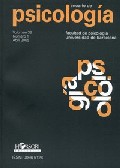Working memory, reading comprehension and reasoning in secondary school
Abstract
The main objective of this paper was to assess working memory, reading comprehension and reasoning abilities of two groups of Secondary School students (1st and 4th levels), and to analyse the relations among these three cognitive variables. As measures of these three variables we used: the ‘Prueba de Amplitud Lectora’ by Elosúa, Gutiérrez, García Madruga, Luque and Gárate (1996; Spanish version of the Reading Span Test by Daneman and Carpenter, 1980), the ‘Test de Estrategias de Comprensión’ by Vidal-Abarca, Gilabert, Martínez, Sellés, Abad and Ferrer (2007), and a propositional reasoning test including two conditionals and one inclusive disjunction. Moreover, we studied the predictive capacity of these three variables on educational achievement, measured by students’ final scores in diverse subject matters. The results showed an increase with age and school level in working memory and reading comprehension measures but not in propositional reasoning. Likewise, there were a clear pattern of significant correlations between the three experimental variables, as well as between any of them and students’ academic scores. In the Discussion the role of these three cognitive variables in explaining of academic achievement is analysed and some ideas for its improvement are proposed.Downloads
Published
2008-06-16
Issue
Section
Dossier: Mujeres, ciclos vitales y bienestar (Coordina: Anna Freixas Farré)
License
The authors who publish in this journal agree to the following terms:
Authors transfer to the publisher all copyright for the full term of protection and for all the world.
The authors can post a copy of their articles in accordance with the policy of free access to the journal.


